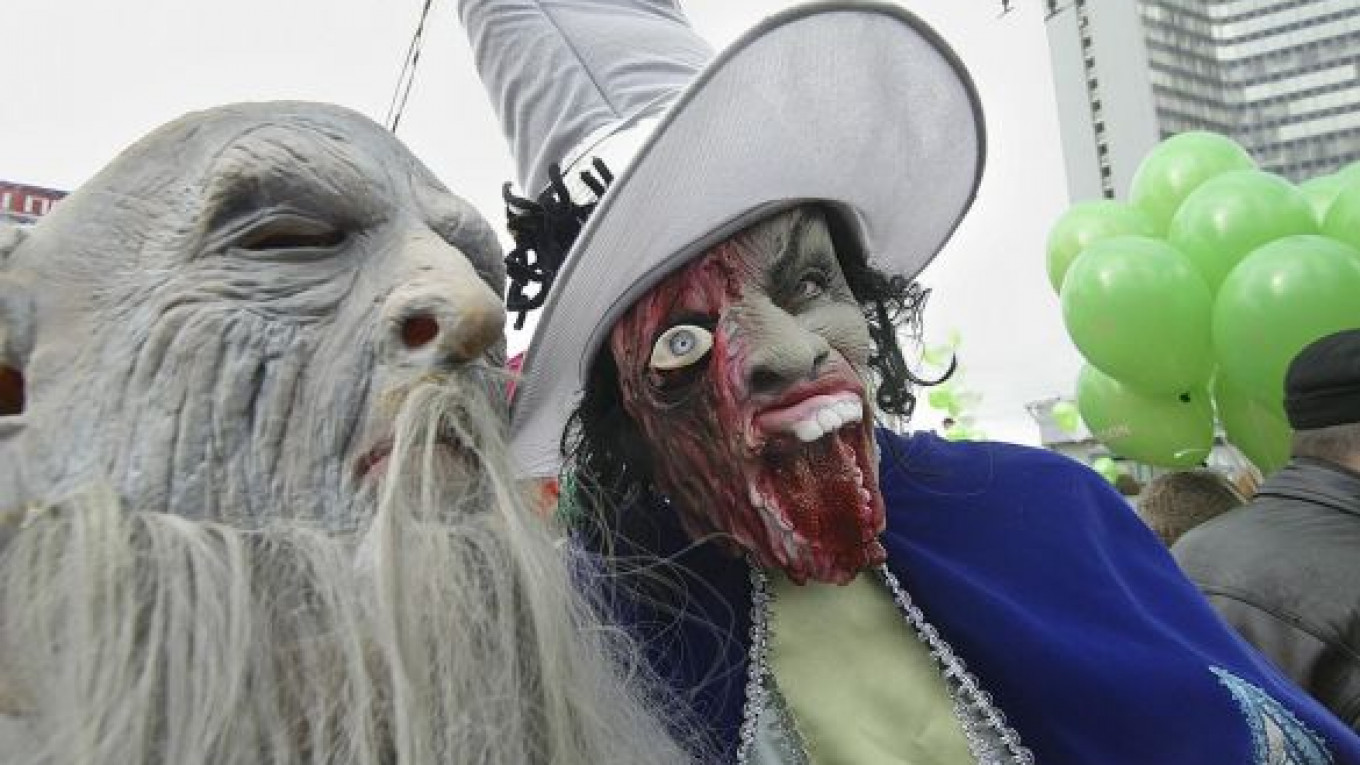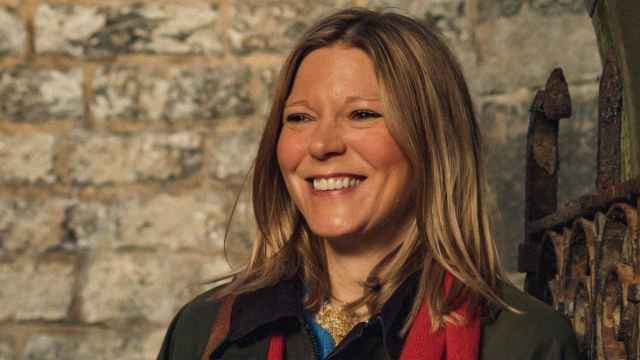Irish Week, held around St. Patrick’s Day in Moscow, is now in its sixth year. The “greening” of Gorky Park has already been carried out in preparation for a mass-celebration that will take place from 3 to 5 p.m. on March 16, in which hundreds of musicians, performers and dancers will unite to celebrate the religious holiday, now synonymous with a general celebration of all Irish culture.
The St. Patrick’s Day parade itself, which will start at noon on Tverskoi Bulvar this year, has been central to Moscow’s Irish community since 1992 and has gradually infected the Russians with enthusiasm as well.
The 2013 festival coincides with Maslenitsa celebrations in Dublin, which marks the first time simultaneous events have been held as part of a growing cultural dialogue between the two countries.
“This year Maslenitsa happens to fall around St. Patrick’s [Day]. The Russian speakers in the country are probably the largest identifiable community in Ireland,” Irish Ambassador Philip McDonagh said. “Roughly 1,500 children have been adopted from Russia to Ireland.”
McDonagh is clearly a great fan of the Silver Age of Russian Literature, speaking with passion about Osip Mandelstam, Anna Akhmatova, and her artist husband Boris Anrep, who created mosaics, including one of St. Patrick.
“Just today we’ve installed a replica of one of these mosaics in the embassy. I was personally involved in this case,” McDonagh said, although he didn’t take credit for the whole idea.
Following the parade, a 14-hour music festival “St. Patrick’s Day & Night” will also take place. Stadium Live will showcase theatrical performances, Irish musicians, video and light projections until 5 a.m.
The accompanying stretched-out week of festivities, from March 13 to 24, is a much newer phenomenon.
“There are only 200 Irish people in Moscow, but there’s a lot of demand,” said Johnny O’Reilly, an Irish filmmaker who organized the parade’s surrounding events. “People like Irish culture here. I think we’ve managed to export our Irishness pretty well.”
O’Reilly has been running the film festival for about six years and said there was a kind of explosion of Irish-themed events in pubs and clubs across the city three years ago. The combination of the parade and the film festival has reached a wide audience, and the popularity of these events has continued to grow.
The films will include “Horrorthon” and the Oscar-nominated animation, “The Secret of Kells.” There will also be comedy performances from Dylan Moran and David McSavage, live storytelling by Eddie Lenihan, and notable musicians such as The Walls and the Finnegan Trio Band.
“I’m looking forward to the music a lot, because we have all these bands that would normally be playing in much larger venues. The Walls for example, supported Bob Dylan and the Red Hot Chili Peppers on their tours,” O’Reilly said.
The festival kicked off in the Central House of Artists on Wednesday, amid clusters of green heart-shaped balloons arranged into shamrock-shapes, rivers of guinness and whiskey, and intermingled with upbeat traditional music, as enormous Irish wolfhounds and their carers navigated the crowds.
As well as marking the festival’s first night, the venue held the pre-screening of “Good Vibrations,” a film documenting the life of the “Godfather of Punk,” Terri Hooley. It will next be shown on Friday, alongside an interview session.
Hooley, a Belfast music-fanatic who opened the Good Vibrations record shop in the early 1970s during the violent “troubles” in Ireland, is credited with playing a pivotal role in the rise of bands such as The Undertones, The Outcasts and Rudi.
“Everyone got out very quickly during that time,” he recalled. “It’s amazing that what we did then is now held so highly. The Belfast City Council tried to ban gigs.”
The film portrays Hooley’s almost childlike enthusiasm for attempting to prioritize the shop, his DJ nights, label and gigs over the religiously weighted ethno-nationalism rocking the country, and occasionally over his family and finances too, although Hooley reports that his ex-wife thinks the film is too harsh on him in this respect.
In the film’s early stages, Richard Dormer, who plays Hooley, sarcastically tells a police officer trying to shut down a show, “Officer, I’d like to report a civil war outside.” Later on, surprise is expressed by another police officer that half of the touring group are Protestant and the other half Catholic.
Hooley called the depiction “scarily accurate” and said “Richard Dormer does me better than I do myself.”
“But he can’t drink as much as me,” he added humorously.
Hooley has upset a number of fans at the SXSW festival in Texas by declining to appear and venturing out to Moscow instead, a visit that he described with near-disbelief as “a dream come true.”
Despite the high international demand which precedes the official release of “Good Vibrations” later in March, Hooley’s heart remains firmly in Belfast. Credited with putting the Northern Irish capital back on the music map, he recalled that two receptions had to be held for this declaration, a lord mayor’s reception and a “people’s” reception, because “the punks said they wouldn’t turn up” to the official event.
However, for the duration of this festival in Moscow, the self-professed anarchist stands alongside fellow countrymen such as the Ambassador of Ireland, an unusual combination to say the least.
Headline acts at “Day & Night” will appear at Stadium Live, located at 80/17 Leningradsky Prospekt. “Good Vibrations” will be shown on Friday as part of Irish Film Festival, which takes place from March 13 to 24 at the Central House of Artists on 10 Krimsky Val. “Ticket to Dublin” contemporary Irish music runs from March 22 to 23.
Contact the author at artsreporter@imedia.ru
A Message from The Moscow Times:
Dear readers,
We are facing unprecedented challenges. Russia's Prosecutor General's Office has designated The Moscow Times as an "undesirable" organization, criminalizing our work and putting our staff at risk of prosecution. This follows our earlier unjust labeling as a "foreign agent."
These actions are direct attempts to silence independent journalism in Russia. The authorities claim our work "discredits the decisions of the Russian leadership." We see things differently: we strive to provide accurate, unbiased reporting on Russia.
We, the journalists of The Moscow Times, refuse to be silenced. But to continue our work, we need your help.
Your support, no matter how small, makes a world of difference. If you can, please support us monthly starting from just $2. It's quick to set up, and every contribution makes a significant impact.
By supporting The Moscow Times, you're defending open, independent journalism in the face of repression. Thank you for standing with us.
Remind me later.






